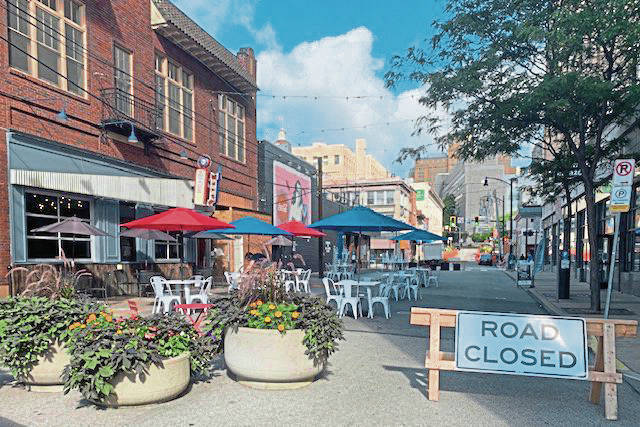Jordan Justus and Prajwal Kotamraju: Street-smart ways to help Pa. small businesses recover
When President Biden unveiled his $2.3 trillion infrastructure plan in March, he did so not from the White House or a monument in the nation’s capital. The “once-in-a-generation investment in America” was announced at the Carpenters Pittsburgh Training Center.
The president has frequently held Pennsylvania up as a model of American economic reinvention. As the state comes back to life post-covid-19, the question now is, how do we innovate to revive our economy and help restaurants, shops and other storefront businesses thrive once more? With 46.6% of the workforce in the state employed by small businesses, it’s a pressing issue to address.
Economic recovery policies will be needed on a governmental scale. But there are some practical steps we can take to help our small- business owners immediately, starting right on the streets of our cities and towns.
The City Council of Philadelphia, for instance, passed a bill that extends the Streets Department’s authority to close the public right-of-way so restaurants can continue using sidewalks for outdoor dining. The Harrisburg Downtown Improvement District closes several downtown streets on Saturday nights so restaurant-goers can enjoy a robust outdoor space. Both initiatives are part of a national trend to allocate public space to allow small businesses to move outdoors. With covid-19 still a threat, this goes a long way in ensuring restaurants and shops can service customers in a ventilated setting. Yelp data has shown that restaurants located on “slow streets” that limited vehicle traffic during the pandemic experienced a surge in business from patrons.
But reconfiguring streets to create public pedestrian space can bring other challenges for small businesses. Parking is one of them, because making a shop or restaurant accessible to customers is a critical piece of the revenue stream for street-facing businesses. In Pittsburgh’s most congested metro areas, a project to measure parking and delivery activity is underway to understand how shifts caused by the pandemic are affecting the way our city moves around. From what the city learns, they will be able to make informed decisions on how to use our street space in a way that best serves businesses and their customers. What is learned in Pittsburgh could be broadened to improve traffic flow and reduce pollution across the state.
Informed, thoughtful changes to busy streets make it easier to park and also streamline the pickup experience for food delivery drivers, resulting in less double parking, faster deliveries and fresher food. By innovating how we charge for street parking to a per-minute basis, with incremental rate increases the longer a person is at the curb, the city can incentivize parking turnover. This translates into more parking availability, which in turn means more customers and more revenue for businesses on a given street. You only pay for the parking you use, and this takes the guesswork and potential penalties involved with feeding a meter.
Delivery vehicle traffic is also a big part of the changes the pandemic has brought to our city streets. The World Economic Forum projects a 36% increase in e-commerce activity by 2030. As delivery vehicles increasingly block our streets, take up customer parking access to storefronts and pollute our air, changes will be necessary. Initiatives that create “smart zones” at the curb have been tested around the country in places like Aspen, Colo. and Omaha, Neb. These dedicated loading and unloading areas drastically improve delivery vehicle efficiency, reducing idle times (and the accompanying emissions) while creating more curbside access for would-be customers of small businesses.
Incentivizing parking turnover and managing delivery traffic is more than a traffic or business issue. It is also an environmental issue. Both Philadelphia and Pittsburgh have committed to reaching carbon neutrality in the next 30 years. Drivers searching for parking is estimated to be 30% of all traffic, and overall traffic accounts for about 29% of all U.S. greenhouse gas emissions. When we increase parking availability, we reduce pollution. When we make deliveries more seamless, emissions from idling vehicles go down.
In his remarks at the Carpenters Training Center, Biden said he will rebuild the backbone of America not for those on Wall Street, but for the people of places such as Pennsylvania: hard-working and community-oriented families and business owners who rely on everyday infrastructure to make ends meet. He challenged us to “imagine what we can do, what’s within our reach if we modernize” that infrastructure. We can start right on our city streets, and revive our economy from the street up.
Jordan Justus is CEO and co-founder of Automotus; Prajwal Kotamraju is co-founder and head of computer vision.
Remove the ads from your TribLIVE reading experience but still support the journalists who create the content with TribLIVE Ad-Free.

